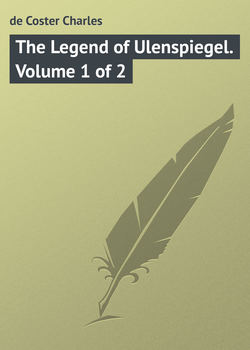Читать книгу The Legend of Ulenspiegel. Volume 1 of 2 - de Coster Charles - Страница 10
Book I
X
ОглавлениеOne morning Soetkin beheld Claes with head down wandering about the kitchen like a man lost in his own thought.
“What grieves thee, husband?” said she. “Thou art pale, wroth, and distraught.”
Claes answered in a low tone, like a growling dog:
“They are going to renew the Emperor’s cruel edicts. Death will hover once more over the soil of Flanders. Informers are to have the half of the victims’ goods, if the goods exceed not a hundred florins carolus.”
“We are poor folk,” said she.
“Poor,” said he, “but not poor enough. There are some of that vile crew, ravens and vultures living on corpses, who would denounce us to divide a basket of charcoal with His Majesty as well as a bag of carolus. What had poor Tanneken, the widow of Sis the tailor, who perished at Heyst, buried alive? A Latin Bible, three gold florins, and some pewter pans that her neighbour coveted. Johannah Martens was burned for a witch, being first flung into water, for her body had floated and they took it as a judgment of heaven. She had some poor bits of furniture, seven gold carolus in a purse, and the informer wanted half. Alas! I could tell thee the like until to-morrow, but come, goodwife, life is no longer worth the living in Flanders by reason of these edicts. Soon every night will the chariot of death pass through the town, and we shall hear the skeleton shaking in it with a dry clatter of bones.”
“You must not frighten me, husband. The Emperor is the father of Flanders and Brabant, and like a father is endued with long-suffering gentleness, patience, and compassion.”
“He would lose too much by that,” said Claes, “for he inherits the goods that are confiscate.”
Of a sudden sounded the trumpet and gnashed the cymbals of the town herald. Claes and Soetkin, carrying Ulenspiegel in their arms turn about, ran to the sound with the crowd.
They came to the Townhall, before which were the heralds upon horseback, blowing their trumpets and clashing their cymbals, the provost holding the wand of justice and the procurator of the commune on horseback, holding in both hands an edict of the Emperor and making ready to read it to the assembled throng.
Claes heard that it was thenceforward straightly forbidden, to all men in general and in particular, to print, read, have, or maintain the writings, books, or doctrine of Martin Luther, Johannes Wycliff, Johannes Huss, Marcilius de Padua, Æcolampadius, Ulricus Zwinglius, Philippus Melancthon, Franciscus Lambertus, Joannes Pomeranus, Otto Brunselsius, Justus Jonas, Johannes Puperis et Gorcianus, the New Testaments printed by Adrien de Berghes, Christopher de Remonda, and Joannes Zel, full of Lutheran and other heresies, banned and condemned by the Theological Faculty of the University of Louvain.
“In like manner neither to paint or pourtray, nor cause to be painted or pourtrayed either opprobrious figures of God and the Blessed Virgin or of their saints; nor to break, rend, or efface the images or pourtraitures made in honour, memory, or remembrance of God and of the Virgin Mary or of saints approved by the Church.
“Furthermore,” said the proclamation, “no man, of whatever station, shall put himself forward to discuss or dispute upon Holy Writ, even upon matters that are held in doubt, if he is not a theologian renowned and approved by a great university.”
His Sacred Majesty enacted among other penalties that suspected persons should ever after be incapable of holding honourable estate. As for persons fallen a second time into their error, or persons who were stubborn therein, they should be condemned to burn by a slow fire or quick, in an envelope of straw, or fastened to a stake, at the discretion of the judge. Other men should be executed by the sword if they were noble or reputable burgesses, churls by the gallows, and women by burying alive. Their heads, for a warning, should be planted on spikes. And there would be confiscation to the Emperor of the goods and chattels of all that lay within the limits of confiscation.
His Sacred Majesty granted to informers the half of all possessed by the condemned, provided their goods did not amount in all to one hundred pounds in Flanders money. As for the Emperor’s portion, he reserved to himself the right to employ it in works of piety and alms, as he did at the sack of Rome.
And Claes went sadly away, with Soetkin and Ulenspiegel.
